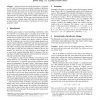Free Online Productivity Tools
i2Speak
i2Symbol
i2OCR
iTex2Img
iWeb2Print
iWeb2Shot
i2Type
iPdf2Split
iPdf2Merge
i2Bopomofo
i2Arabic
i2Style
i2Image
i2PDF
iLatex2Rtf
Sci2ools
102
Voted
ECAI
2008
Springer
2008
Springer
From Belief Change to Preference Change
Various tasks need to consider preferences in a dynamic way. We start by discussing several possible meanings of preference change, and then focus on the one we think is the most natural: preferences evolving after some new fact has been learned. We define a family of such preference change operators, parameterized by a revision function on epistemic states and a semantics for interpreting preferences over formulas. We list some natural properties that this kind of preference change should fulfill and give conditions on the revision function and the semantics of preference for each of these properties to hold.
Artificial Intelligence | ECAI 2008 | Preference Change | Preference Change Operators | Revision Function |
Related Content
| Added | 19 Oct 2010 |
| Updated | 19 Oct 2010 |
| Type | Conference |
| Year | 2008 |
| Where | ECAI |
| Authors | Jérôme Lang, Leendert van der Torre |
Comments (0)

